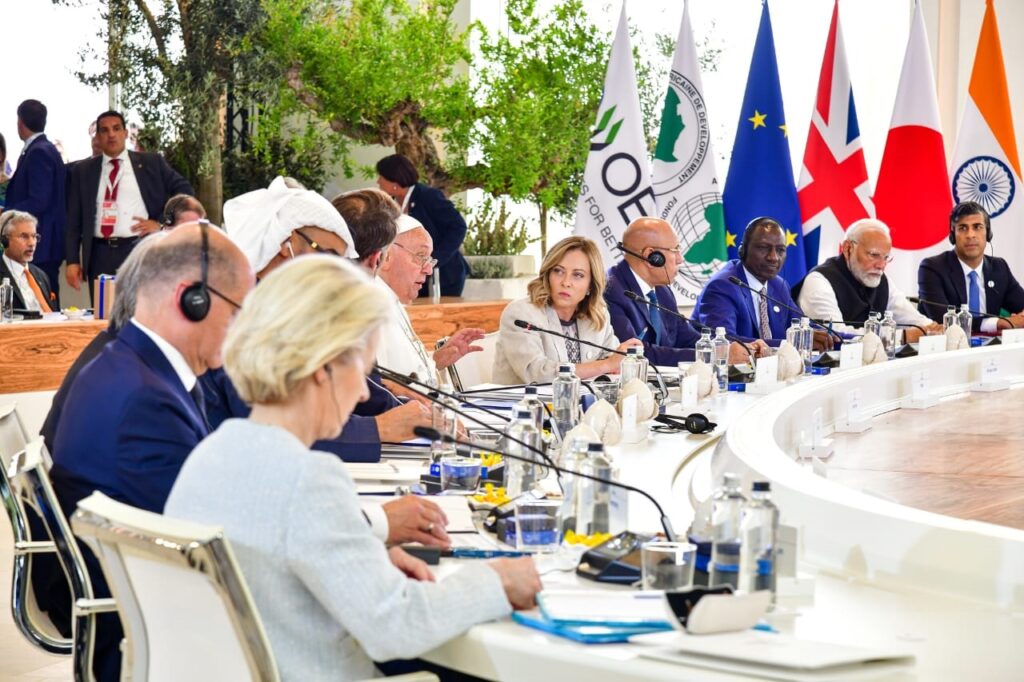- President William Ruto of Kenya urges for reforms to the global financial system to provide Africa with access to long-term concessional finance and greater decision-making power.
- He highlights the critical need for investments in Africa’s infrastructure and clean energy projects to drive sustainable development and economic growth.
- The G7 Summit sought partnerships with African nations, aiming to bridge the continent’s infrastructure gap and support its development goals.
At the 50th G7 Summit held in Borgo Egnazia, Italy, President William Ruto of Kenya made a compelling case for the transformation of the global financial system to better serve Africa. Addressing an audience of world leaders, Ruto called for reforms that would grant the Global South, particularly Africa, access to long-term concessional finance and a greater voice in international decision-making processes.
“Reforming the multilateral global financial system is crucial for enabling Africa to access concessional, long-term, and agile finance,” Ruto emphasized. He highlighted the need for the G7 nations to support the Common African Position on the reform of the United Nations Security Council, arguing that no global institution can genuinely advocate for universal values while continuing to marginalize 1.4 billion Africans from 54 nations.
Partnerships for Progress
Ruto underscored the significant opportunity for the G7 to invest in infrastructure projects that address Africa’s substantial infrastructure deficits, thereby accelerating the continent’s development. He urged for a robust G7-Africa partnership aimed at fostering growth and transformation across the continent.
“There is a significant opportunity for the G7 to invest in projects that address Africa’s infrastructure gaps and turbocharge our development,” he stated. This call aligns with the G7’s announced focus on fostering global partnerships and sustainable development initiatives, particularly in Africa.
Energy for Growth in Africa
In a collective declaration, representatives from Canada, the Republic of Congo, Côte d’Ivoire, Ethiopia, France, Germany, Italy, Japan, Kenya, Mozambique, Nigeria, South Africa, the United Kingdom, the United States of America, and the European Union recognized the pivotal role of affordable clean energy in achieving sustainable economic growth and social development. This initiative, aligned with both the 2030 Agenda for Sustainable Development and the African Union’s Agenda 2063, also supports the climate goals of the Paris Agreement.
The G7’s ‘Energy for Growth in Africa’ initiative aims to develop bankable clean energy projects, attract private capital through public finance, and overcome investment barriers in clean energy across Africa. This initiative will engage with various stakeholders, including governments, the private sector, financial institutions, and community groups, in partnership with the United Nations Development Program and the International Energy Agency.
Africa’s Infrastructure Gap
The G7 Summit highlighted Africa’s pressing infrastructure needs, a critical obstacle to the continent’s economic progress. According to the African Development Bank, Africa requires $130-170 billion annually to bridge its infrastructure gap, with a financing shortfall of $68-108 billion each year. While traditional infrastructure investments in power, water, and transport are essential, African nations are also prioritizing modern infrastructure such as world-class telecommunications, secure data centers, research centers, and social infrastructure to support sustainable growth and innovation.
Investment in Modern Infrastructure
Ruto illustrated Kenya’s progress by citing a collaboration with Microsoft and G42 of the UAE to develop a $1 billion green data center in Kenya. This project exemplifies the transformative potential of green energy and artificial intelligence in fostering development.
“The collaboration with Microsoft and G42 to develop a green data center in Kenya showcases the future of transformative possibilities,” Ruto said. Such initiatives demonstrate Africa’s commitment to leveraging its abundant energy resources and pioneering technologies for substantial economic and social benefits.
G7 Summit: The Path Forward
The G7 Summit provided a platform for African leaders to voice their aspirations and challenges, emphasizing the need for equitable financing and transformative partnerships. The discussions underscored the G7’s commitment to moving beyond rhetoric and forging genuine partnerships with African countries. The successful implementation of these initiatives will require continued engagement, investment, and collaboration between the G7 and African nations.
As the summit concluded, the spotlight remained on how these global leaders would translate their commitments into tangible actions that support Africa’s development goals. The path forward involves not just promises but concrete steps towards building a resilient, inclusive, and sustainable future for Africa.
President Ruto’s address at the G7 Summit highlighted the critical need for global financial reforms and substantial investments in Africa’s infrastructure. His call to action resonates with the broader agenda of the G7, aiming to foster sustainable growth and development through meaningful partnerships. The summit’s outcomes will be crucial in shaping the future trajectory of Africa’s economic and social landscape, ensuring that the continent’s vast potential is fully realized.
Read also: Global financial reforms: President Ruto’s blueprint for a new-look IMF
